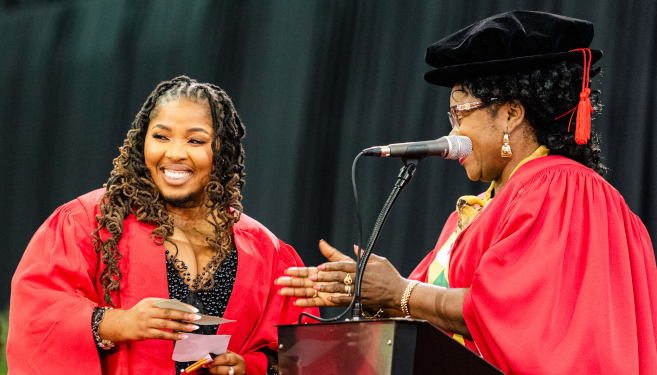
Non-Intimate Femicide: The Hidden Crisis
- Posted by ukzn-admin
- Categories News
- Date October 1, 2024

Non-Intimate Femicide: The Hidden Crisis
‘Non-intimate femicide is one of the most widespread, persistent and devastating human rights violations in South Africa. It is a major obstacle to the fulfilment of women’s human rights and to the achievement of the National Gender-Based Violence and Femicide Strategic Plan 2020 – 2030.’
Dr Bongolethu Diko’s PhD study on: “Understanding Femicide in South Africa: The Study of Non-intimate Femicide in KwaMashu and Umlazi in the Province of KwaZulu-Natal” is a sobering investigation of a global blight on a local environment.
‘Non-intimate femicide involves the killing of women by someone with whom they did not share an intimate relationship, encompassing a broad range of femicide subtypes such as stranger femicide, femicide of women working in the sex trade, sexual femicide, femicide in the context of human trafficking, and armed conflict femicide. This form of femicide does not only occur in South Africa; it happens around the world, across all generations, nationalities, communities and spheres of our societies, irrespective of age, ethnicity, disability or other background,’ said Diko.
She explained that, in South Africa, non-intimate femicide is not recognised as a separate crime category that requires specific attention, and statistics on this crime are generally lodged with those of murder. Due to a lack of knowledge of non-intimate femicide among both individuals and scholars, there is limited understanding of the factors that contribute to it.
Her study revealed that KwaMashu and Umlazi are among the top 30 townships with a high level of gender-based violence (GBV), with corrective rape a prominent factor that contributes to non-intimate femicide in these areas. Corrective rape is a form of rape based on one’s sexual orientation or gender identity with the intention to force a victim to conform to heterosexuality or traditional gender roles based on sexual orientation.
‘Some men lack comprehensive knowledge and understanding of people’s right to choose their sexual orientation. They believe that raping a lesbian will expose her to the pleasure of sexual intercourse with a “real man” and that this will forcefully reverse her sexual orientation. The probability that such incidents will occur is exacerbated by alcohol and drug use.’
Diko added that when women are not valued and have limited economic power (ecological system theory), they are vulnerable to non-intimate femicide as they are easy targets for men who seek sexual gratification and/or need to demonstrate their superiority. Women with limited economic means are often forced to live in unsafe areas where they cannot afford protection. These areas experience a significant number of thefts and residential break-ins that are primarily perpetrated by males who specifically target vulnerable women who live without the protection of an adult male in the household. The findings revealed that, in cases of domestic burglaries, females were killed because they could possibly identify the perpetrator/s. Some were also abused and killed when they walked the streets alone at night.
Diko’s research also uncovered a significant number of politically motivated killings in which women were targeted in or near the KwaMashu Hostel. ‘These murders can be attributed to the deep social conditioning that denies women the right to leadership positions, particularly in culturally entrenched social settings such as townships. It is therefore evident that the cultural socialisation of communities that still embrace patriarchal norms is instrumental in exposing women to a high likelihood of being killed when they “overstep” the social barrier that separates them from men. Society has indoctrinated men to believe that women are not supposed to be in leadership positions where they may be deemed “superior” to men; only men are perceived as sufficiently capable of taking on leadership roles in communities where most residents still adhere to traditional norms.’
She contends that this affirms the theory that the habits that are acquired and learned in socialisation processes play a significant role in sustaining power dynamics and gender inequality.
Cognisant that her research reopened numerous emotional wounds for some, Diko prescribed counselling. Participants reported that their communities and police prioritise initiatives focused on addressing intimate femicide over those targeting non-intimate femicide. Encouragingly, a preventive measure employed by the police involves patrolling communities.
According to Diko, addressing non-intimate femicide in KwaMashu and Umlazi requires three key interventions. Firstly, the South African Police Service, non-governmental organisations and the National Prosecuting Authority should collaborate to establish awareness programmes that focus on preventing rape homicide, promoting respect for sexual orientation, and advocating for gender equality. These programmes should target individuals at multiple social levels and include school campaigns to help children unlearn toxic masculinity, homophobia and patriarchal attitudes. Secondly, there is a need for more police officers and homicide investigators to be deployed in high-risk areas to improve safety and reduce the workload of investigators. Lastly, stricter penalties should be imposed on those caught with illegal firearms as these weapons, often used to intimidate women, contribute to femicide.
Diko described her research journey as emotionally arduous and expressed deep gratitude to God, her parents Mrs and Mr Gasa, her siblings and extended family for their encouragement. She also thanked her supervisor, Professor Shanta Balgobind-Singh, and her friends. She added that she is proud that she was able to cultivate the tenacity, resilience and determination required to complete her study.
Words: Rakshika Sibran
Photograph: Sethu Dlamini
You may also like

Research Tackles the Scourge of Missing Persons

PhD Study Promotes Inclusivity in Urban Planning

